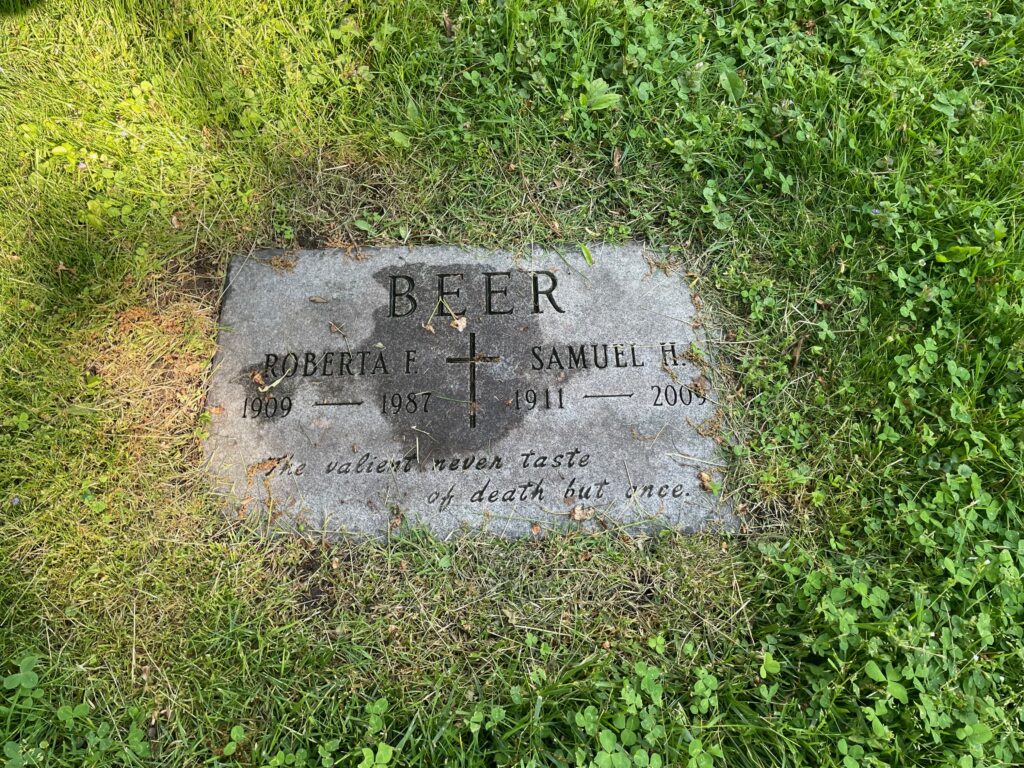Erik Visits an American Grave, Part 1,679
This is the grave of Samuel Beer.

Born in Bucyrus, Ohio in 1911, Beer went to a military academy where he was classmates and football teammates with Barry Goldwater, and then was on to Michigan for college. He was a Rhodes Scholar at Oxford, then came back and was a speechwriter for Franklin Delano Roosevelt in the mid-30s. He did some reporting too. But then he decided to go to graduate school in political science, at Harvard. He got his PhD in 1943. He then volunteered for the military and won a Bronze Star for his heroism at the D-Day landings.
After the war, Harvard hired him as a political science professor in 1946. He never left, teaching there for the next 36 years. His time in Europe, including in occupied Germany after war, made him dedicate his career to European politics, especially the UK. He wrote A City of Reason in 1949, which was more of a personal political philosophy (or so I understand) based on the ideas of Alfred North Whitehead. In 1956, he published Treasury Control, about British financial policy. 1965’s British Politics in a Collectivist Age was a big-deal book, an overarching examination of postwar British politics, especially the battles between the Tories and ascendant Labour. He wrote a follow-up to that in 1982 as British politics transformed, titled Britain Against Itself: The Political Contradictions of Collectivism. Later in life, he turned much of his attention to the U.S. and wrote To Make a Nation: The Rediscovery of American Federalism, in 1993.
Beer was also known for his commitment to the classroom. He had a very popular intro course called “Western Thought and Institutions” that he taught over his whole career, evidently avoiding the frequent desire of elite scholars to only teach graduate students in their tiny specialty. Rather, he believed in the mission of higher education writ large and did his part to train generations of students what at the time was some of the peak of intellectual education. Today, a course of this title would be almost impossible to teach and for good reason–what is the West? What if this is just a justification for colonization and imperialism? Who gets counted in the West? The last hold out of this kind of education is St. John’s College, both in Maryland and New Mexico and which I know well because my brother went to the latter. I had a lot of criticism of the idea that educating people that the core foundation of modern thought is strictly an elite white male thing. But there’s a market for it, no question. In any case, none of this is really a critique of Beer, for whom none of this would have made much sense since he was a man of his time as much as any of us.
Beer remained a key liberal connecting academia to government, He led Americans for Democratic Action from 1959 to 1962. He also served as an informal advisor to JFK. He was a big institutionalist guy and for that reason really struggled with the new politics of the late 60s. He hated the student protestors (to be fair, so did Al Gore who was a student at the time) because he opposed politicizing the classroom and he feared the new politics would enter the classroom, which was of course true and remains a controversial issue today. I don’t know how one avoids this and I don’t think one really does. You can create false centrist narratives in the classroom that might make students feel comfortable, but also maybe not, and that is in itself a politicization of the classroom. Although he did advise Kennedy and had tons of connections in Washington, he largely avoided the Cambridge to Washington pipeline of super elite insiders, followed people Henry Kissinger, McGeorge Bundy, so many others, preferring scholarship in the end.
After retirement, Beer spent his life doing elite senior academic things. He taught here and there. He was at the Wilson Center in DC for while. He died in 2009 at his home in Washington. He was 97 years old. When he died, people called him the “last of the Anglophiles” though his books on Britain were increasingly critical as he aged, as he lost patience with the nation’s politics.
Samuel Beer is buried in Mount Auburn Cemetery, Cambridge, Massachusetts.
Samuel Beer was president of the American Political Science Association in 1976-77. If you would like this series to visit other APSA presidents, you can donate to cover the required expenses here. Robert Dahl, president in 1966-67, is in Westerly, Rhode Island and Gabriel Almond, president in 1965-66, is in Palo Alto, California. Previous posts in this series are archived here and here.
